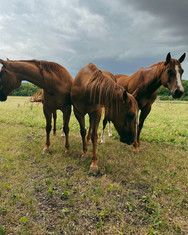Fort Worth's Best Horse Boarding Facility
- Oct 1, 2023
- 14 min read
What to expect when boarding my horse at Benbrook Stables?
Benbrook Stables has been boarding horses since 1957. Voted Best Boarding facility in Fort Worth year after year. We love and care for each of our boarded horses as if they were our own. We provide individualized care for each of our boarded horses and can feed according to your horse's dietary needs. If your horse needs supplements, senior, high protein, cubes, pellets, or just alfalfa, our barn manager will provide the care your horse needs and want. You can feel confident our experienced staff will take care of your horse the way you would if you were doing it yourself. We are here because of our passion for horses and the horse industry. We are lifelong horse lovers and have the knowledge it takes to give the very best care available.
Benbrook Stables is one of the finest horse boarding facilities in North Texas. When you select our full care option, we feed only the highest quality grains and hays. Our grain is comprised of whole oats, barley, corn, and oil. It is 9% protein, 6% fat, and 6% fiber. It is all-natural with no by-products or processed by-products. Our hay is the highest quality coastal from irrigated fields right here in Texas. We feed two times a day with turnout between feedings. Your horse will have access to free-range coastal round bales for 75% of the day. We do close the gate to the hay pasture at night. Some of our guys overindulge and gain a little more weight than the owners like.
We have compiled a list of questions about Benbrook Stables, what we offer,, and our philosophy of caring for horses. We have also included questions about purchasing horses for beginners. We hope these questions and answers will help you when deciding to board your horse with us.
How much Land does Benbrook Stables have for turnout?
We are on 100 acres of land located at the trailhead of Lake Benbrook's equestrian trails. approximately 90 acres are divided by pipe fencing and slick horse wire fencing to provide multiple safe pastures for turnout and grazing.
Does Benbrook Stables have riding arenas and round pens?
We have two full size arenas for the boarders to use at any time. The larger arena is 350ft x 120ft with a full announcers booth, roping boxes, bucking chutes, return and and holding pens.
Our second arena is just a little smaller and is great to practice on our jumps or run barrels, poles and flags. Both have great dirt and sand mix which make perfect footing for your horse and any discipline. We keep them dragged and ready to ride at all times.
We also have two round pens. Our larger round pen is approximately 65 ft all wooden and a has deep sand. The smaller fence panel round pen is approximately 50ft. and has deep sand like the larger one.
https://www.fortworth.com/listings/benbrook-stables/5839/
https://www.facebook.com/benbrookstablestexas
Our facilities include individual stalls with shavings, multiple safe pastures for daily turnout, a 120 x 350 lighted arena, a smaller lighted riding arena, two round pens, and over 30 miles of scenic trails around Lake Benbrook.
The riding trails are maintained by the U.S. Army Corps of Engineers and are designated horse trails. No motorized vehicles are allowed on the trails.
Throughout the year we host many activities for our boarders, including, playdays, barrel races, group trail rides, campouts, movie nights, volleyball tournaments, softball, and cookouts.
We have been voted the best boarding facility in Texas year after year by various magazines, local readers, and Expertise online.
FULL CARE
www.benbrookstables.com Allows the boarder to just come out and ride. We provide our grain and hay, twice daily. We turn all horses out onto 25 acres of pasture daily Clean stalls, feed buckets and water buckets daily
Full Care in the barn $ 500 Full Care in the paddock $ 475
Studs, show horses and all others left in at all times are welcome for an additional charge of $50 to any level of care, plus the cost of shavings.
PARTIAL CARE
www.benbrookstables.com Allows the convenience of full care, with the boarder providing their own grain and hay or just the grain.
Turn horses out onto 25 acres of pasture daily Clean stalls, feed buckets and water buckets daily
PARTIAL CARE IN THE BARN:
Boarder provides the grain only ..............$450
Boarder provides grain and hay ..............$425
PARTIAL CARE IN THE PADDOCKS:
Boarder provides grain only...................$ 425
Boarder provides grain and hay............$ 400
Who will be taking care of my horse while boarded at Benbrook Stables? The Staff at Benbrook Stables
Everyone who works at Benbrook Stables has a passion for horses or to learn about horses. We love our boarders and take care of them with love, kindness, and patience We strive to make their life with us as happy as possible. If it is caring for an injury, bathing, blanketing in the winter, catching for the farrier or vet when you can't come out, we are happy to do it all. We will even keep them ridden for you if you can't make it out often enough and do not want to ride a fresh horse. We will completely train for you or just keep them tuned up. We are a full service equestrian center and can provide any service associated with your horse. We will haul long and short distances, coach you on playday and rodeo events, or help you with your young horse. We help with problem horses too. Anything you need for your horse, we are here to help.
Can I leave my trailer if I board my horse at Benbrook Stables?
Yes. We have a designated area for trailers and a private tack locker for each boarder
Where can I ride my horse in Fort Worth?
Do boarders have full access to the property if they have their horses at Benbrook Stables?
Yes. A lot of our boarders show or rodeo and need to haul in after hours, so the gates are not locked at night. We also have many boarders that work during the day and need to come ride in the evenings. Others want to ride later when the weather is cooler ing the Summer or early in the morning before work. We are open year round and boarders have access to their horses twenty-four seven.
Where can I ride my horse if I board at Benbrook Stables
Benbrook Stables is the trail head to over 30 miles of designated horse trails around Lake Benbrook. All you have to do is ride right out our back gate to hit the trails and ride all you like on thousands of acres of Corp. land all the way around the lake. You have scenic views of the lake and Downtown Ft. Worth. You will cross meandering streams, ride through open fields and narrow trails. there are beautiful vistas and of course the gorgeous Texas landscape full of wildlife. We also have two full-size arenas to ride and train that are available at any time.
Is it cheaper to board a horse or keep it at home?
If you have the space and facility to keep your equines at home, it's more cost effective and offers a number of advantages that boarding does not. If you are one of the lucky few, however, who has the option to either board or horse keep yourself, the decision may be difficult.
What is a Coggins test?
A Coggins test is a simple blood test that checks for a serious disease called Equine Infectious Anemia (EIA), which is caused by infected flies.
Depending on where you live, you may be required to prove a horse is free of EIA in order to sell, trade, or transport it.
Currently, there are no cures or vaccines for EIA. Horses that test positive must be put down or quarantined permanently. You should ensure your prospective horse has had a Coggins test prior to purchase.
Do horses prefer to live in or out? “Horses evolved to live in herds in the wild,” they'll say. “They weren't born to be confined in stalls and stables. They're best left out in the open where they can run around, socialize with their herd, and graze and forage in the field.” It's certainly true that horses are happiest when they're free to move. At Benbrook Stables we believe this philosophy fully. We let our boarded guys stay outside as much as possible. They are only kept in their stalls when necessary. When the weather is stormy, extremely cold or muddy. Our studs, of course, are kept in their stalls, however, they too have daily turn out in one of the round pens, or arenas.
Can my family or friends come and ride with me on the trails if I board y horse at Benbrook Stables?
Yes. Benbrook Stables has lesson and trail horses available for rent. If your family, friends, co-workers, or even your sweetheart want to come out and ride with you, they can call for a reservation and get a horse to ride along with you on the trail ride.
Can I take lessons on my horse at Benbrook Stables?
Yes. If you need a little refresher course or if you just got your first horse and you need to know how to catch, halter and ride, our experienced instructors and trainers can help you with anything you need. They can show you all the basics, ground work, arena work and help you with any problems you may be having.
Does Benbrook Stables train horses?
Yes. We have a full staff of experienced trainers to take your horse from beginning to fully trained. We train with patience and kindness. Never rushing young horses or heavy hands on a problem horse. We believe in gaining trust and acceptance over force. we will always take the time needed to get a training horse to know us, trust us and be willing to do what we ask over "breaking". We believe a trusting horse is a life long horse that will get you through any scary situations with confidence.
How much does it cost to own a horse without boarding?
Caring for a horse can cost anywhere between $200 to $325 per month – an annual average of $3,876, according to finance consulting site Money Crashers. Some of these costs include: Grain/feed. Hay.
How much does it cost to feed a horse for a month?
Food. A healthy 1,100-pound horse will eat feed and hay costing from $100 to more than $250 per month on average, although horses let out to graze on grass will eat less hay. The price of hay depends on the type, quantity at time of purchase and time of year.
How long does a 50 lb bag of horse feed last? A 50 lb bag will last approximately 1 week. Feeding 2 Scoops per day for maintenance. A stressed horse or one that needs to gain weight will need more grain until it has shown marked progress and back to a better body condition. An easy keeper, or one that gains weight and keeps their weight easily, will need much less grain and your 50 lb. bag of grain will last much longer. Some grains may weigh a little more or less so this is a rule of thumb and will increase or decrease depending on the needs of our horse.
How many bales of hay will a horse eat a month? A horse can eat anywhere from 15-30 pounds of hay a day, which generally equates to a half of a 45/50-pound square bale of hay per day. Always remember to take into consideration the quality of your hay. Your horses dietary needs can vary at different times of the year, if they have been ill, or if they are a hard or easy keeper. There are many variables when it come to how much hay your individual horse may need at any given time. You just have to be sure you are providing good quality, clean, mold free hay. The type and quality of hay are key to keeping your horse healthy.
How much land do you need for a horse in Texas?
If you are attempting to figure the carrying capacity of land for a horse, then a good rule of thumb is 1-1/2 to 2 acres of open intensely managed land per horse. Two acres, if managed properly, should provide adequate forage in the form of pasture and/or hay ground. But this is highly variable depending on location.
What is the equine law in Texas?
The Texas Farm Animal Liability Act (FALA) began in 1995 as the Texas Equine Act, a narrow statute that protected horse owners from liability for participants' injuries resulting from the inherent risks of interacting with horses.
Can you write off horse expenses?
If your horses are a “necessary and ordinary” cost of maintaining your business, then of course all the necessary expenses of keeping them are tax deductions!
How do you buy a horse for riding? from Horse Rookie.com
Consult with a trusted trainer or experienced horse friend and decide what type, age, and level of horse is right for you
If you are working with a trainer, they will be a great resource for narrowing down what things are most important (e.g. horse’s specific skills and personality) and what things are just nice-to-haves. Be sure to look at and ride more than one horse before purchasing. A vet check is highly recommended. Try to stick to your budget, but be ready to spend at least $1,000 more than planned.
Step 1: Select the right type of horse. ...
Is it a stallion, gelding, or mare? Breed?
How old is he? How tall?
What is her general temperament?
Who is currently riding the horse and for what discipline?
What discipline(s) is she suited for?
What level of rider is he suited for?
How much are you asking? Is it negotiable?
Step 2: Determine your budget. ...
Step 3: Select a Buyer's Agent. ...
Step 4: Assess and Ride the Horse. ...
Step 5: Negotiate a Price or Make an Offer. ...
Step 6: Inspect and Accept the Horse. ...
Step 7: Closing the Deal. ...
Step 8: Delivery of the horse.
There are so many things to keep track of, from what the horse looks like to their training to scheduling appointments. Without a checklist, something important could be overlooked. You’ll want to get to know the history of any horse you are considering purchasing, as well as the relationship of the current owner to the horse. Make sure the person answering your questions has enough experience with the horse to give you real answers and watch for any red flags.
Feeding/Care
If you are serious about purchasing a particular horse, you’ll want to understand what it’s current lifestyle, care, and diet is like. This will help you understand if they will be a good fit for the barn or pasture you’ll be housing them in and how much time and money you should expect to spend on their basic care
What is a PPE for horses?
A pre purchase exam (PPE) is a standard health check performed by a vet, typically of the buyer’s choosing, before a purchase is finalized.
This will typically include a physical evaluation, lameness and movement evaluation, and follow up on any suspected issues.
The buyer and seller should both participate and what is included will vary based on the vet, budget, and specific needs
Should you use logic or emotion to buy a horse?
Both, but the best outcome is usually from logic first, emotion second. Listen to the recommendations of your trainer, trusted horse friend, or vet over what your heart says. If you get the all-clear, however, it’s safe to let your heart make the final choice.
When trying to determine if a horse is a good fit for you, personality is one of the most important factors. You’ll want to know the details of the horse’s health, history, and training to know if it’s a smart purchase for you, but personality is what makes the difference between a horse you fall in love with and one you “just ride.”
Consider the horses health. While you can never guarantee that a horse will remain healthy, you’ll want to fully understand the current health and medical history of any horse you are considering purchasing.
When was he last seen by a vet?
Has he ever had any illnesses? Injuries?
How often do you deworm? When was the last time? Which dewormer do you use?
Is he current on vaccinations? Which ones does he receive?
Does she have any known health issues?
Do you have any concerns about his health that have not been evaluated yet?
Has she ever had colic?
Does he have any history of being lame?
Who is your vet? Will you allow them to release your horse’s medical records to me for review?
Will you allow my vet to perform a pre-purchase exam?
Has he received regular dental care? From who? Any known issues?
When were her teeth last floated?
Does she have any issues with her feet? Is she shod?
What is his current routine?
Where does she currently live? What type of turnout space does she have? Does she get turned out with other horses?
What does she eat? Any supplements?
Has he been around any other animals (e.g. livestock, dogs, cats)? How did he respond?
Does she have any allergies? Has she ever responded poorly to a food or supplement?
Is he easy to catch?
How does she respond to new environments?
How should you determine your budget?
It depends on what you’re looking for in a horse. Something more casual, such as a horse for trail rides, or to teach you the ropes, may cost $5,000 or less. If you’re looking for a horse to show and take you up the levels, then expect to spend a minimum of $5,000 to $10,000. thinking of purchasing a car. if you want a new, reliable, great-looking car, spending $1,000 may not get you all the car you want. If you want a horse that will not buck, is fully trained, pretty, and safe for the whole family, it is ulikely that $1,000 will get you the horse you want either.
Enlist Professional Help
No one should ever look at a horse alone, especially if you’re a beginner. Make an appointment with your trainer to evaluate the horse with you.
Here are a few things to look for:
The condition of the horse
If he stands and ties quietly
How he behaves while being tacked
All three gaits under saddle, in both directions
Should you expect to pay a commission on a horse?
This varies and depends on your trainer. Some may charge a small fee (10%-20%) and others may do it for free. If they don’t charge you, get them a small gift to say thank you.
Online Shopping Tips
Be very wary when shopping for a horse online. Pictures (and descriptions) can be deceiving. ALWAYS make arrangements to see and try the horse in person before you buy. Here are a few keywords and phrases to look for.
Avoid horses described as:
Not suitable for beginners
Spirited
More “go” than “whoa”
Barrel prospect
Any type of “prospect”
Lots of potential
Ready to finish your way
Consider horses described as:
Quiet
Bombproof
Proven
Calm
On a 1-10 scale (where applicable), 1-4 is ideal
Are there additional questions to ask when buying a colt?
Yes. purchasing a colt is very different from buying a green broke or a finished horse.
You will need to know things like...Is he halter broke, how much has he been handled, does he lead on a leadline, has he been haltered, has anyone actually started hi on any training, despooking etc.... Be sure to have an experienced person ask all the necessary questions before purchasing a colt if you do not have extensive horse experience and training.
Are there additional questions to ask when buying a trail horse?
If your primary use will be trail riding, consider finding a horse that has plenty of experience. You’ll want to ensure the horse has a calm temperament, is sure-footed, and does not spook easily. It is typically a bad idea to go to a sale barn. Sale barns are a 'buyer beware" situation. Unless you have lots of experience buying horses it is never a good idea.
What are the most important questions to ask before leasing a horse?
Choosing a horse to lease should be taken just as seriously as purchasing one. Make sure you are still asking all of the important questions in this article first.
Once you feel confident the horse is a good fit, it’s really important to make sure the owner and lease agreement are too. You’ll want to ask a lot of questions about the terms of the lease like who is responsible for paying for the horses care (e.g. board, routine health care, illnesses and injuries, farrier, supplements)?
Who makes medical decisions? Can you choose your own barn, trainer, vet, farrier, etc? Are there any limits on your usage of the horse (travel, showing, riders)? What happens if the horse is seriously injured and is no longer rideable? Are there any other conditions under which you could end the lease early?
Leasing a horse can be anything from a few dedicated riding days per week at a flat rate to full care where the owner is rarely, if ever, involved. Make sure you fully understand what the expectations are and that you get them in writing. It also helps to have a good relationship with the owner.
Finding someone who seems friendly, trustworthy, and respectful can go a long way toward making the experience more positive.
We hope you will give us a call at 817-249-1001 and schedule a time to come tour our facility for your horseboarding.
Top 10 Horse boarding facilities in Ft Worth Yelp































































































































































































